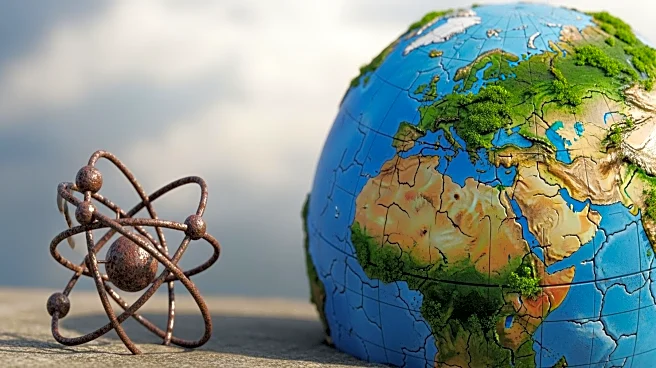What's Happening?
Greenpeace France has called for an immediate cessation of the uranium trade between France and Russia, which resumed in 2021 after a hiatus. The environmental group released images showing containers of spent uranium being loaded onto a cargo ship in Dunkirk,
France, destined for Russia. This trade involves reprocessed uranium being sent to Russia, where it undergoes conversion and re-enrichment, with a portion returned to France for reuse. Greenpeace argues that this trade contradicts French President Emmanuel Macron's statements on reducing dependency on Russia. The organization has previously protested these shipments, leading to a temporary halt in 2022. However, the trade resumed, with companies like Orano, EDF, and Rosatom participating. Greenpeace is urging France to disclose the amount of uranium exported since 2022 and to terminate all related contracts.
Why It's Important?
The resumption of uranium trade between France and Russia highlights ongoing geopolitical tensions and the complexities of energy dependencies. Greenpeace's call for an end to this trade underscores the environmental and political challenges associated with nuclear material management. The trade's continuation could undermine France's efforts to assert energy independence from Russia, especially amid broader European sanctions on Russian energy exports. The situation also raises questions about the disposal of radioactive waste, as France reportedly has significant stockpiles of reprocessed uranium. The potential for future sanctions on Russia's nuclear trade, as suggested by Greenpeace, could further strain international relations and impact global energy markets.
What's Next?
Greenpeace is advocating for France to take more aggressive action to end the uranium trade with Russia. This could involve increased pressure on the French government to align its actions with its stated policy goals of reducing reliance on Russian energy. If France decides to halt the trade, it may need to find alternative solutions for managing its reprocessed uranium stockpiles. Additionally, the situation could influence broader European Union discussions on energy security and sanctions against Russia. Stakeholders, including environmental groups and political leaders, are likely to continue debating the implications of this trade and its alignment with international energy policies.















